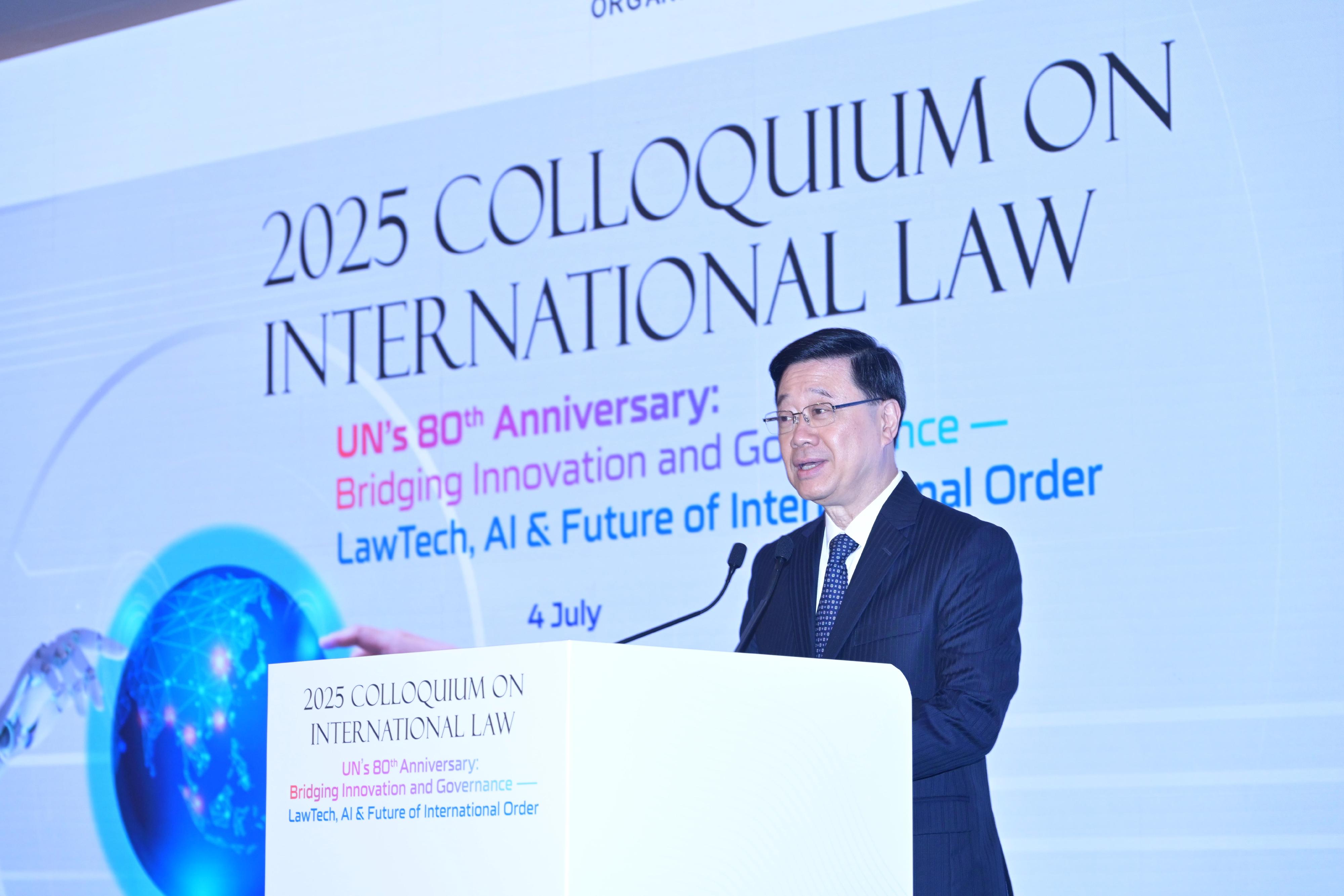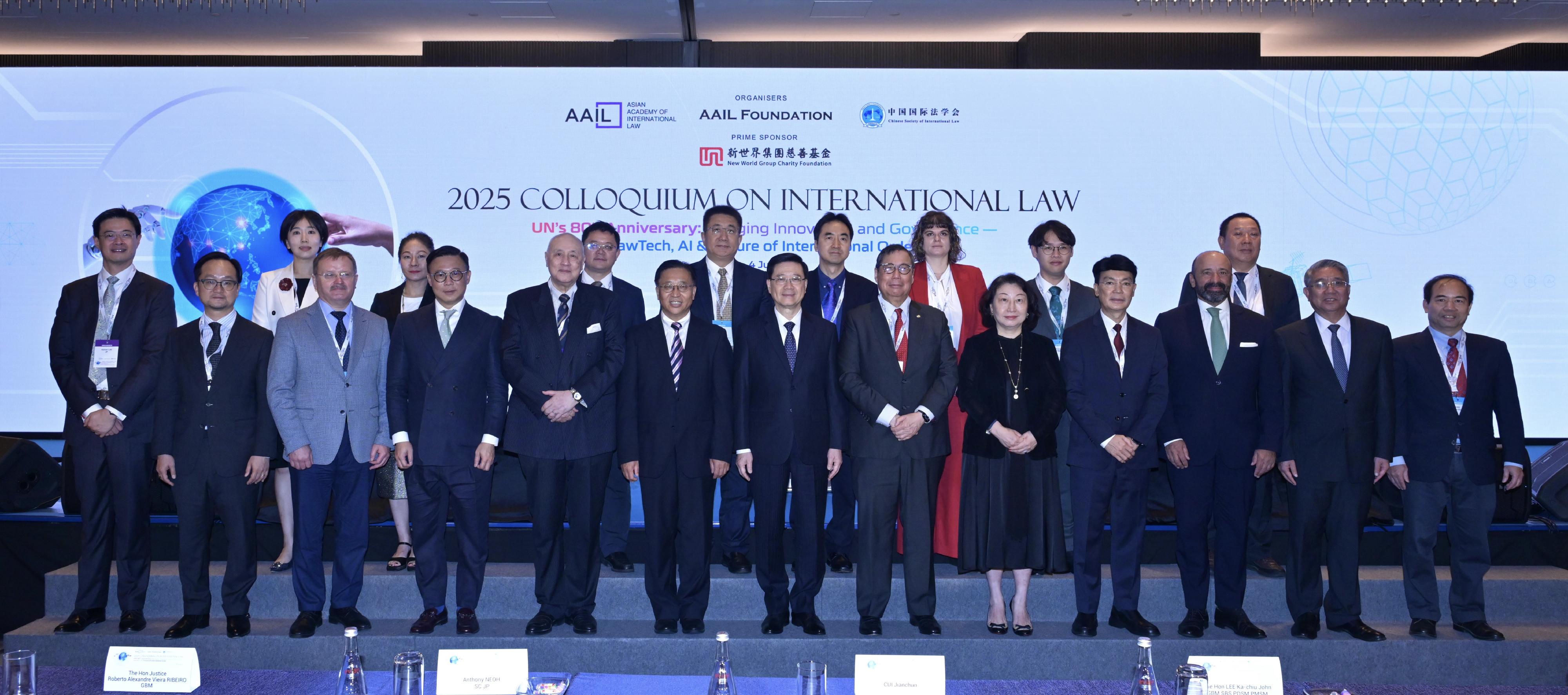Speech by CE at 2025 Colloquium on International Law (English only) (with photos/video)
***************************************************************************************
Commissioner Cui Jianchun (Commissioner of the Ministry of Foreign Affairs of the People's Republic of China in the Hong Kong Special Administrative Region), Professor Teresa Cheng (Co-Chairman of the Asian Academy of International Law), Dr Anthony Neoh (Co-Chairman of the Asian Academy of International Law), consuls-general, distinguished guests, ladies and gentlemen,
Good morning. And welcome to Hong Kong. Welcome to the 2025 Colloquium on International Law.
Gathered here today, are some 200 legal professionals and government and institutional leaders – from Hong Kong, the Mainland and some 40 jurisdictions in Asia and around the world.
I would also like to extend a special welcome to His Excellency Dr Kamalinne Pinitpuvadol, Secretary-General of the Asian-African Legal Consultative Organization, here with more than 30 delegates from the international organisation. Also, a special thanks to Mr Miguel de Serpa Soares, former Under-Secretary-General for Legal Affairs and United Nations Legal Counsel.
This year's Colloquium spotlights two key themes: the United Nations' 80th anniversary, and LawTech, AI (artificial intelligence) and the future of the international order. I was told that we have simultaneous interpretation by AI on the screen. All in the aspiration of bridging innovation and governance.
The establishment of the United Nations, in 1945, marked a new chapter in multilateralism, creating an international organisation responsible for collective action on global issues, with the goal of fostering peace, security and development.
China, our country, is a founding member of the UN (United Nations) and one of the UN Security Council's five permanent members. China actively participates in the UN, playing a significant role in shaping international law and responses to global issues.
Under the unique "one country, two systems" principle, Hong Kong enjoys unparalleled access to both the Mainland and the world. Hong Kong participates in various commissions and groups under the UN, as members of Chinese delegations, in accordance with the Basic Law.
In the eight decades since the UN's establishment, technology has transformed our world. Its endless reshaping of societies, and peoples, is also a UN priority. And that very much includes artificial intelligence, a fast-growing area in innovation and technology.
From trading floors and hospital wards, to schools and law courts, AI now permeates every sector – not as a distant future, but as today's operational heartbeat. Hong Kong, dedicated to developing into an international I&T (innovation and technology) centre, recognises this tidal shift. Mastering AI is no longer a competitive edge. It is the existential infrastructure for every industry and sector.
Last September, a UN Secretary-General's High-level Advisory Body on AI published the report "Governing AI for Humanity". It highlighted the need to boost global co-operation, noting that only an "inclusive and comprehensive approach to AI governance" can address the "multifaceted and evolving challenges and opportunities AI presents on a global scale".
Hong Kong is strategically positioned to promote international collaboration in advancing AI.
Under "one country, two systems", we have long been a "super connector" and "super value-adder", bringing together China and the rest of the world. And providing key value-adding professional services along the way.
The HKSAR Government actively promotes LawTech, including online dispute resolution and the use of AI.
Our Department of Justice has established a Consultation Group on LawTech Development, which dedicates its efforts to developing LawTech strategies for the legal and dispute resolution sector.
Last month, we held our first LexGoTech Roundtable, to advance the sector's understanding of LawTech and its applications, with focused discussions on the opportunities and challenges of LawTech and AI.
As for online dispute resolution, Hong Kong is one of seven economies, alongside such places as Indonesia, Japan, Singapore and the United States, to follow APEC's (Asia-Pacific Economic Cooperation) Collaborative Framework for Online Dispute Resolution of Cross-Border Business-to-Business Disputes. The Framework was designed to help businesses resolve disputes online through negotiation, mediation and arbitration.
We have also been collaborating with the United Nations Commission on International Trade Law, establishing a Hong Kong-based Project Office for collaboration with the Commission in 2020. The Project Office provides important support to the Inclusive Global Legal Innovation Platform on Online Dispute Resolution, which converges international efforts, across different jurisdictions, to advance this form of dispute resolution. That, ladies and gentlemen, is a salient example of our dedication to international collaboration, and the development of technology for legal services.
The HKSAR Government fully supports the work of the United Nations, especially in promoting the peaceful settlement of international disputes.
Just over a month ago, the Convention on the Establishment of the International Organization for Mediation was signed here in Hong Kong, I'm pleased to say.
The International Organization for Mediation, or IOMed, will become the world's first inter-governmental, international organisation dedicated to resolving international disputes through mediation, a peaceful means to maintain international peace and security, as stipulated in the Charter of the UN.
I am grateful to the Central Government for its support of Hong Kong, as well as the trust from other signing states, for giving us the honour of serving as the IOMed's headquarters. It will be based in the former Wan Chai Police Station, a historic architecture that has long been part and parcel of Hong Kong's law and order, and I am hopeful it will open by the end of the year.
The IOMed's mandate is clear and compelling: to resolve international disputes based on mutual respect and understanding. And it will be available to all countries, regardless of their culture, language or legal system.
That, ladies and gentlemen, will certainly improve global governance. And promote world peace and stability.
My thanks to the Asian Academy of International Law and its Foundation, as well as the Chinese Society of International Law, for once again organising this seminal international law event, for bringing prominent international legal professionals and speakers to Hong Kong to discuss the latest issues, concerns and promising developments in law.
And while you're here, make good time to discover what the world city of Hong Kong has to offer – in arts, culture and entertainment, on our islands and coastal areas, our Michelin-starred restaurants, dim sum parlours, pubs, diners and cafes – all of them brimful of the best of East and West. Enjoy it all.
I wish you all a rewarding Colloquium, and the best of legal business, and mediation, in the year to come.
Thank you.
Ends/Friday, July 4, 2025
Issued at HKT 10:15
Issued at HKT 10:15
NNNN




